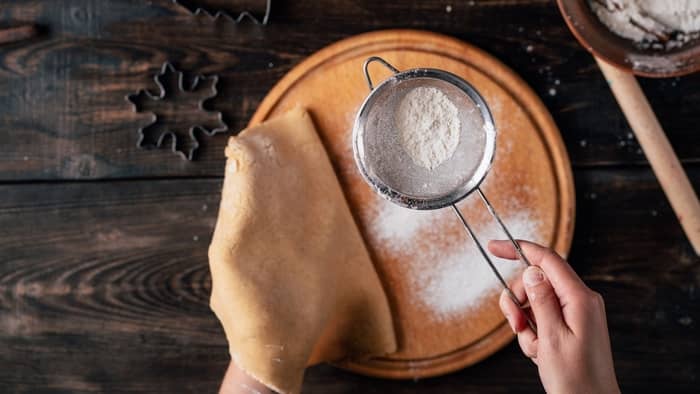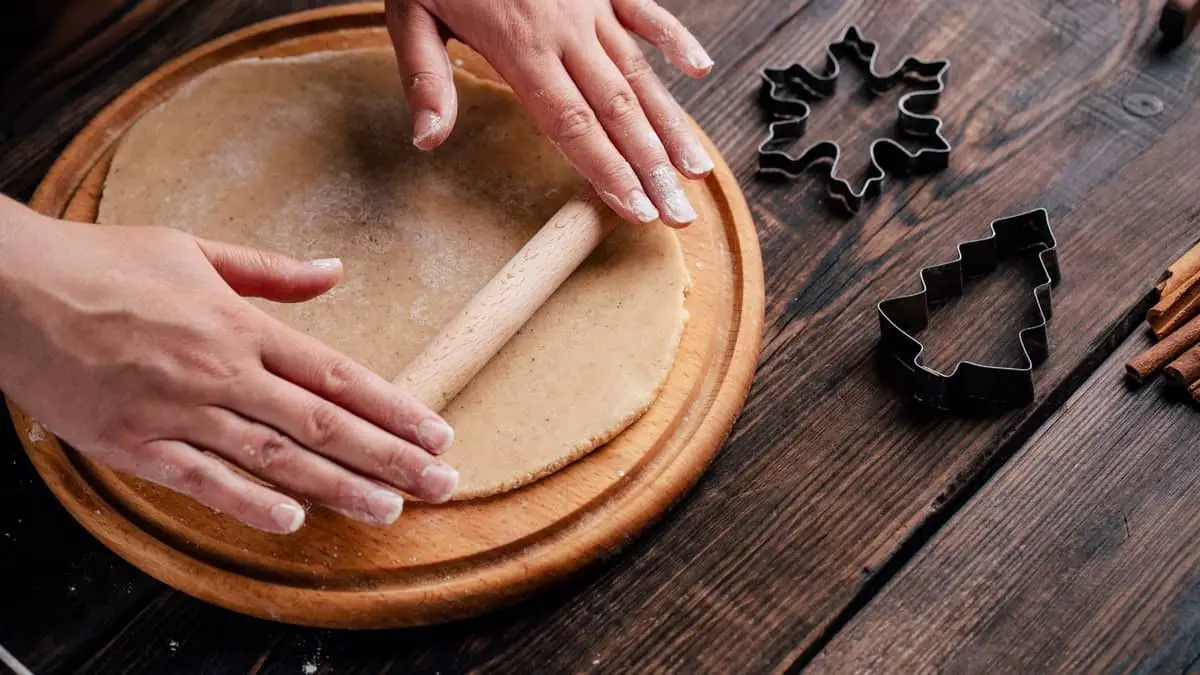Last Updated on January 22, 2023
Cookie dough sticking to a rolling pin is frustrating and causes a mess when you are trying to bake. Fortunately, there are some handy tricks to prevent this annoying situation from happening. No matter what you are baking, a sticky rolling pin will only cause more problems.
For some recipes, using a rolling pin is vital. However, without the proper measures, your dough may end up sticking to the rolling pin, causing more harm than good. If this happens, you will struggle to get your dough rolled out evenly to the right thickness.
How To Keep Dough From Sticking To A Rolling Pin
Dough stick to rolling pins is a common problem many bakers face at one point or another. Many dough recipes require the use of a rolling pin in order for the dough to receive the right size for shaping. Common recipes that often call for rolling include sugar cookies, gingerbread cookies, cinnamon rolls, pizza dough, biscuits, pastries, and pie crusts.
Popular types of rolling pins include wood, plastic, and metal. If you use your rolling pin just how it is, it will likely cause sticking problems. Fortunately, there are some simple solutions that will prevent the dough from sticking.
When working with dough, always be sure to use a clean surface. You will also want to dust the surface with flour as well to prevent it from sticking to your work surface.
Flour
Flour is a simple and effective way to keep your dough from sticking. Simply cover the outside of your dough with a small amount of flour. You can also dust some flour on top of your dough as well.
Though flour is a great method to use, be sure to not add too much flour. Adding too much flour can change the texture of your dough, potentially making it dense. You may need to roll flour onto the rolling pin a few times throughout the process of rolling your dough.
Cooking spray
Cooking spray is used in many recipes to prevent sticking. It will not change the flavor of your baked good and will work effectively to stop any sticky messes.
Simply spray a light layer of cooking spray on your rolling pin and on top of your dough. Don’t overdo it with the cooking spray, as a little will go a long way.
Chill the dough
If you are working with cookie dough, it is almost always a good idea to chill it before rolling it out. Chilling the dough helps firm up the dough, as the warm dough can cause the butter to start to melt in the dough.
Ideally, you will want to refrigerate the cookie dough for at least 30 minutes. Some recipes will call for chilling the dough for at least two to three hours. If your dough gets too soft and sticky when working with it, pop it in the fridge for another 15-20 minutes to help firm it up.
Use a non-stick cover
If you are wanting a reusable option, you can use a non-stick cover for your rolling pin. Simply slide the cover over your rolling pin and then use it.
Most covers are made of cotton, which can work wonders to prevent sticking. Be sure to wash the non-stick covers after every use.
Dolce Mare Silicone Dough roll – Non-Stick Rolling pin –
Use wax or parchment paper
Wax and parchment paper both do great jobs to prevent sticking when working with dough. Simply place a layer of wax or parchment paper on top of your dough and then carefully roll out the dough.
Using wax or parchment paper works great to create a smooth, flat surface when rolling. You won’t have to worry about sticking when using it as well.
Regularly wash your rolling pin
Be sure to wash your rolling pin after every use. This is especially important if it is wooden, as you don’t want any stuff hardening on it.
In general, it is best to hand wash your rolling pin with warm water and dish soap, then thoroughly dry it afterward. Some rolling pins may be dishwasher safe, but be sure to check beforehand.
Read more about Amazing Rolling Pin Substitute.
How Do You Unstick Cookie Dough?
Sometimes, even when taking precautions, cookie dough can stick. Though it can be annoying, there are ways you can unstick it and still use it for later. No need to panic and throw out your dough.
If your dough begins to stick, toss some additional flour on it, as well as on your hands. Then, with your floured hands you can carefully begin to unstick it. You can also rub a small amount of vegetable oil or cooking spray on the stuck dough to help loosen it.
In some cases, you can also place the stuck dough in the fridge for around 15 minutes. This will help it firm up and make it less sticky, making it easier to work with. The heat from our hands can cause the dough to become too warm, which can be problematic if it contains eggs and butter.
How To Prevent Cookie Dough Sticking To A Rolling Pin
When cookie dough sticks to a rolling pin, it can be very frustrating. The dough becomes difficult to work with and it makes it hard to shape.
Fortunately, there are steps you can take to stop a sticky mess from forming. To prevent your rolling pin from sprinkling, you can coat it with a light layer of flour or cooking spray. You can also use wax or parchment paper or even get a non-stick cover.

If you are working with cookie dough, it is always a good idea to chill your dough before rolling to make it less sticky. Sometimes you may have to stick your dough in the middle of working if it gets too warm to firm back up. In addition, be sure to wash your rolling pin well after each use to keep it clean.
Do you have any questions regarding cookie dough sticking to a rolling pin? If so, please ask any questions about rolling out dough and how to prevent sticking in the comment section below.
FAQs
How Do You Unstick Cookie Dough?
If your dough begins to stick, toss some additional flour on it, as well as on your hands. Then, with your floured hands you can carefully begin to unstick it. You can also rub a small amount of vegetable oil or cooking spray on the stuck dough to help loosen it.

Ever since she was a young girl, Anna has been a lover of desserts. As an adult, she enjoys
baking a variety of desserts from cakes, cookies, brownies, bread, and more from scratch. She
enjoys sharing her passion for baking with others who also have a sweet tooth. From properly
measuring ingredients to making sure they are the correct temperature, Anna knows the
importance small details can make in baking. She wants to share her experience with others in
hopes they can make the most delicious baked goods. When she’s not busy blogging, Anna
enjoys trying new recipes in the kitchen.


